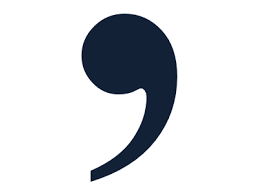中文词源
comma 逗号
来自PIE*kop,砍,劈,进一步来自*skep, 砍,劈,词源同ship, shape. 原指劈开的一个分枝。
英语词源
- comma
-
comma: [16] Greek kómma meant literally ‘piece cut off, segment’. It derived from the verb kóptein ‘cut’, relatives of which include Russian kopje ‘lance’, source of the coin-name kopeck, and probably English capon. Kómma came to be applied metaphorically, as a technical term in prosody, to a small piece of a sentence, a ‘short clause’, a sense which it retained when it reached English via Latin comma. It was not long before, like colon, it was applied to the punctuation mark signifying the end of such a clause.
=> capon, kopeck - comma (n.)
- 1520s as a Latin word, nativized by 1590s, from Latin comma "short phrase," from Greek komma "clause in a sentence," literally "piece which is cut off," from koptein "to cut off," from PIE root *kop- "to beat, strike" (see hatchet (n.)). Like colon (n.1) and period, originally a Greek rhetorical term for a part of a sentence, and like them it has been transferred to the punctuation mark that identifies it.
权威例句
- 1. Not a comma was left out.
- 一个逗号也没漏掉.
- 2. The two clauses are separated by a comma.
- 这两个分句由一个逗号分开.
- 3. Yet still the comma gets no respect.
- 尽管如此,逗号仍然不受人尊重.
- 4. He seemed to query every damn comma.
- 他简直对每一个逗点都不轻易放过.
- 5. But the same could be said -- could it not? -- of the humble comma.
- 不过这话用在小小的逗号上, 何尝不是如此?

